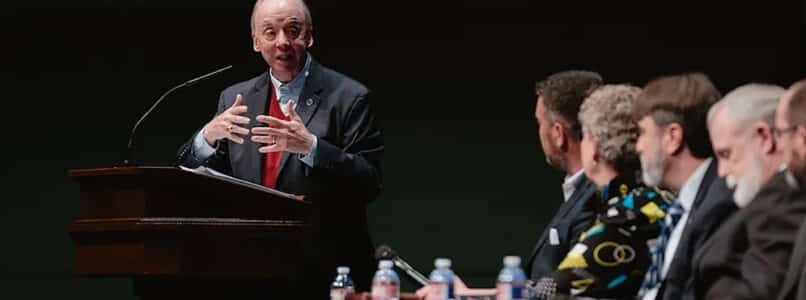CARROLLTON (BP)—More than 1,000 people say they plan to participate in the 44th annual gathering of the Korean Council, set for June 9-11 at New Song Church in this northwestern suburb of Dallas. This includes pastors, staff and lay members of the Southern Baptist Convention’s 973 Korean churches.
Known formally as the Council of Korean Southern Baptist Churches in America, the fellowship each year meets in conjunction with the SBC’s Annual Meeting.
“Our future direction aligns with the SBC’s Vision 2025,” Korean Council’s Executive Director James Kang told Baptist Press. “You can’t simply sit back and maintain the status quo. We must look to the future by sending more missionaries, planting more churches, revitalizing existing ones and cultivating ministries for the next generation.”
Among additional initiatives is a partnership with IMB to host 10 regional missions conferences. The first four took place at Semihan Church in Metro Dallas, New Life Church in Metro San Francisco Bay, Tacoma First Baptist in Metro Seattle, and Global Missions Church in Maryland, Metro D.C.
“Thanks to many prayers, these conferences, and God’s activity, we are seeing more missionaries being recruited for the IMB,” Kang said. “We’re also witnessing a revival of missions within the church, especially among the laity.”
A Southern Baptist thrust to Korean immigrants started with the Home Mission Board appointment of Don and Esther Kim to reach international university students in Los Angeles. That led in 1957 to the start of Berendo Street Baptist Church, which today is known as the “mother” of all Korean churches in the SBC.
At least 1,700 people attend Sunday morning worship services at the church, which changed its Korean name in 2022 to Saenuri, or “New Community.”
While perhaps 80% of the SBC’s Korean congregations see fewer than 100 people in Sunday morning worship, Berendo/Saenuri is among a handful with at least 1,500. This includes New Song Baptist and Semihan Church, both in Carrollton. Other similarly large Korean churches: New Vision Church in San Jose, Calif., Good Community Church in Torrance, Calif., Tacoma (Wash.) First Baptist Church and Seoul Baptist Church of Houston.
About 15 Korean Southern Baptist churches draw at least 1,000 people in Sunday morning worship.
“We also have many small churches in rural areas that are decreasing in number and need to be revitalized,” Kang said. “Americans tend to retire in the places where they used to live, while Koreans often retire near the city, and young people also move to urban areas. As a result, we’re seeing a decline in the Korean population in smaller towns.”
About 1.8 million Koreans live in the U.S., according to 2022 estimates by the U.S. Census Bureau. About 70% consider themselves Christian.
“In the early years of the council, the Home Mission Board hired Dr. Daniel Moon to lead the Korean church planting initiative, which resulted in the establishment of many Korean churches,” Kang said.
There is not currently an SBC-wide initiative to plant Korean churches—a need the Korean Council is trying to meet.
“Here in Metro Dallas, where the headquarters for the Korean Council is located, there are 150,000 Koreans and 60 Korean churches. In New York, there are fewer than 10, and in Toronto, fewer than five.”
About 220,000 Koreans live in Metro New York City. More than 100,000 live in Ontario, Canada, most in Toronto.
“We decided to support Korean church planters at $1,000 per month for two years, specifically those planting in strategic cities in the North where there is no Korean church or not enough, much like the SBC does,” Kang said. “Additionally, we are working to help churches grow by offering seminars to help pastors train in evangelism and the revitalization of the church.”
The Korean Council also is working with seasoned pastors to provide coaching and revitalization support to churches requesting it, the executive director added.
At least 30 Korean Southern Baptist churches include English ministries designed to reach all Asians because “our children mingle very well with other Asian peers,” Kang said.
“A lot of churches are asking for help with English ministries,” the executive director continued. “Our young people like to be associated with Koreans but too many churches cannot provide them with what they need in English. We are losing our youngsters in a sense, and when we don’t have the younger generation, we lose the churches and the future.”
The future for the Korean Council started in 1974, when Korean pastors met after the SBC annual meeting in Los Angeles to discuss how they could work together. In 1981, they met again to establish a formal fellowship of Korean pastors “to foster relationships and consolidate the strengths of Korean churches to advance church planting and missions,” according to a recent book by Jongsu Heo titled “The History of the Council of Korean Southern Baptist Churches in Ameria, 1956-2021: Communication, Connection and Cohesion Toward a Holy Calling.”
That pastors’ fellowship, which met for its first meeting in 1982—when there were 203 Korean Southern Baptist churches—evolved into an association of churches in 1993 when there were 600 churches in what today is known as the Korean Council. Members today include 35 churches and 44 pastors in Canada, 16 churches in six South and Central American nations, and more than 900 across the U.S.
“Unifying the Korean churches spread out throughout the United States helps us to know that we are not alone in the mission and call to spread the gospel,” New Song Pastor Peter Hyun told Baptist Press. “Through the different pastor seminars and retreats specified for Koreans in pastoral ministry, pastors are refreshed throughout the year and churches are strengthened by the work of the Holy Spirit. The annual Council of Korean Southern Baptist Churches in America (CKSBCA) is a time that many pastors and families joyfully await throughout the year.”
This article originally appeared in Baptist Press.






























